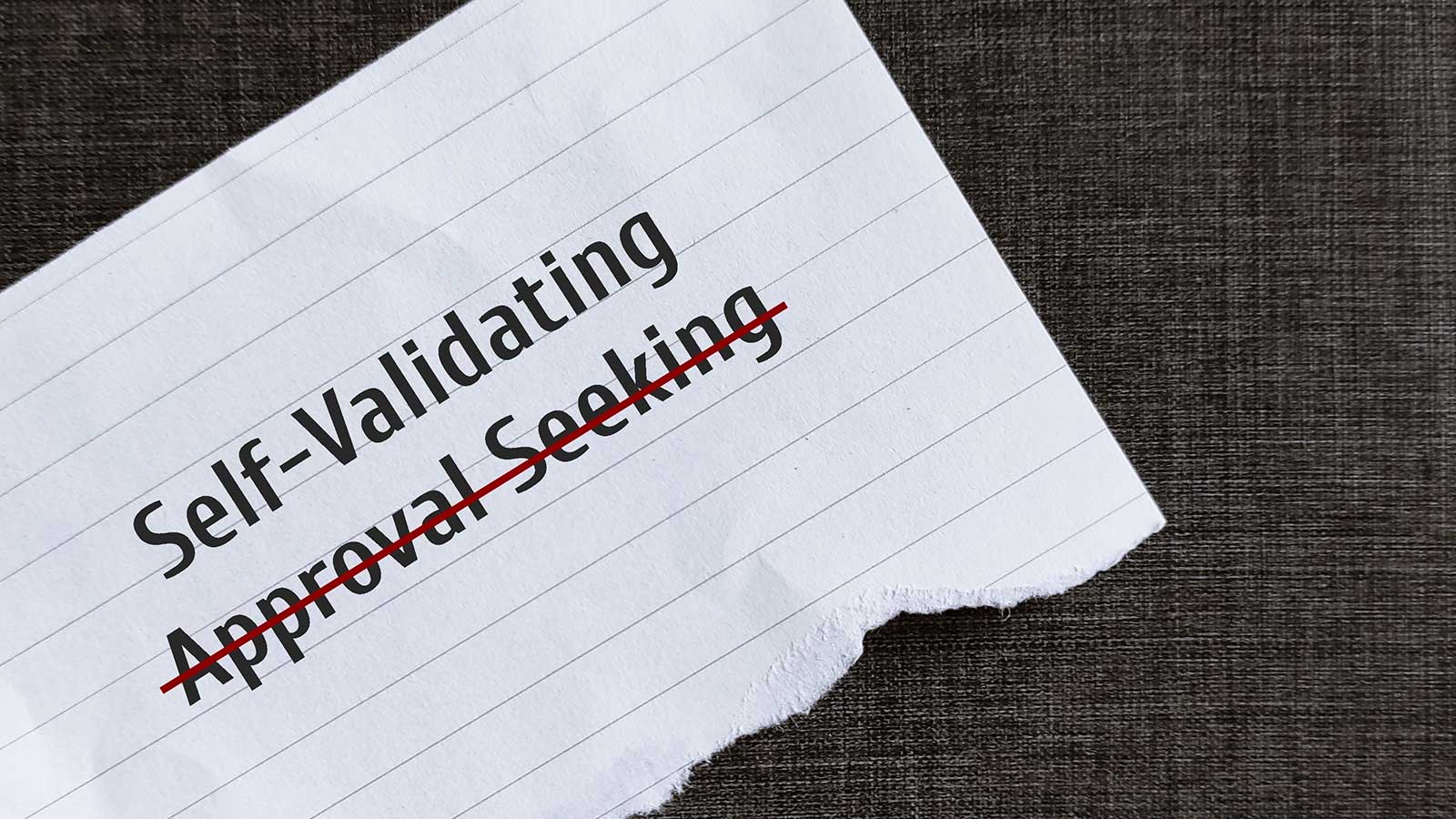Insecurity can manifest in various ways, and sometimes, our behaviors unwittingly signal to those around us that we’re feeling insecure. From seeking validation to belittling others, these actions can have unintended consequences on our relationships and perceptions. In this article, we’ll explore the common behaviors that often indicate insecurity. By recognizing and addressing these tendencies, we can work towards building confidence and healthier relationships.
A Social Media Account That is Shared

Creating joint social media accounts with your partner may seem like a way to showcase your unity, but it can also indicate underlying insecurity. Sharing an account can suggest a lack of trust or a need for constant monitoring and reassurance.
Constantly Seeking Validation

When you constantly seek validation from others, whether through social media likes or constant approval-seeking, it reveals a deep-rooted insecurity. Relying on external validation for self-worth can prevent you from developing true confidence.
Self-deprecating Humor

While humor can be a great tool for connection, excessive self-deprecating humor can signal insecurity. Constantly putting yourself down in an attempt to gain acceptance or deflect compliments can undermine your own self-esteem.
When You Can Dish It Out, But You Can’t Take It

If you find yourself frequently making jokes at the expense of others but become defensive or hurt when the tables are turned, it may be a sign of insecurity. Insecurity often leads to hypersensitivity and an inability to handle criticism or playful banter.
Unable To Acknowledge When You Don’t Know Something

Refusing to admit ignorance or pretending to have knowledge about something you’re unfamiliar with can stem from insecurity. Fear of appearing uninformed or inferior can hinder personal growth and prevent meaningful learning experiences.
Mocking Someone Else’s Achievement

Putting others down or belittling their accomplishments is a classic sign of insecurity. By diminishing someone else’s success, you attempt to elevate your own self-worth. However, true confidence is built by celebrating the achievements of others.
Belittling Others

When you consistently belittle or undermine others, it’s often a reflection of your own insecurities. Putting others down can be an attempt to establish a sense of superiority or mask feelings of inadequacy.
When You One-up Everything

Constantly trying to one-up others in conversations or experiences can indicate deep-seated insecurity. It stems from a need to prove oneself and assert superiority, rather than fostering genuine connections and mutual respect.
Constantly Projecting And Giving Self-serving Compliments

If you find yourself excessively projecting your accomplishments or giving compliments with the expectation of receiving praise in return, it reveals an underlying insecurity. Authentic compliments should come from a place of genuine appreciation, not a desire for validation.
Bragging About Being An “Alpha Male”

Boasting about being an “alpha male” or constantly asserting dominance can be a sign of insecurity. True confidence doesn’t require constant validation or the need to assert superiority over others.
A Person Who “Tells It Like It Is”

Using the guise of “telling it like it is” to justify blunt or insensitive comments can indicate underlying insecurity. Genuine confidence allows for honest communication without resorting to hurtful or demeaning remarks.
Announcing What Type Of Person You Are

Constantly proclaiming your personality traits or characteristics can suggest a need for validation and acceptance. True confidence is demonstrated through actions rather than words.
Putting Others Down For Not Drinking

Judging or criticizing others for choosing not to drink alcohol can reveal a need to fit in or validate your own choices. Insecure individuals may use peer pressure or ridicule to mask their own discomfort.
Making Social Media Declarations

Using social media as a platform to make grandiose declarations or seek attention can be a sign of insecurity. Constantly seeking validation and validation-seeking through carefully curated posts can indicate a lack of self-assurance.
Comparing Yourself To Others

Constantly comparing yourself to others, whether in terms of appearance, achievements, or possessions, can indicate deep-seated insecurity. This habit stems from a fear of not measuring up and can hinder your own self-worth and happiness. Remember, everyone has their unique journey and comparing yourself to others only limits your potential for growth.
Seeking Approval In Every Decision

Constantly seeking approval from others before making decisions reflects a lack of self-confidence. Relying on external validation for every choice can prevent you from trusting your own judgment and hinder personal growth. Learn to trust yourself and make decisions based on your own values and priorities.
Over-apologizing

Apologizing excessively for minor things or taking on unnecessary blame can indicate insecurity. Constantly seeking validation and fearing judgment from others can lead to over-apologizing as a way to avoid conflict or maintain a sense of peace. Remember that genuine apologies are important, but it’s equally essential to develop a healthy boundary and not apologize for simply being yourself.
Fishing For Compliments

Fishing for compliments is a clear sign of insecurity. Constantly seeking reassurance from others about your appearance, abilities, or achievements can indicate a lack of self-esteem. True confidence comes from within, and it’s important to work on building self-acceptance rather than relying on external validation.
Not Being Able To Accept Constructive Criticism

Insecure individuals often struggle to handle constructive criticism. They may perceive any feedback as a personal attack and become defensive or dismissive. Being open to constructive feedback is a sign of strength and a willingness to grow. Embrace the opportunity to learn and improve, rather than letting insecurity hinder your personal development.
Excessive People-pleasing

Constantly prioritizing others’ needs over your own and going to great lengths to please everyone around you can stem from insecurity. People-pleasing behavior often arises from a fear of rejection or not being liked. Remember, it’s important to establish healthy boundaries and prioritize self-care, as true connections are built on authenticity.
Downplaying Your Accomplishments

Downplaying your accomplishments or attributing them to luck or external factors can indicate insecurity. It’s important to acknowledge and celebrate your achievements without diminishing their significance. Embrace your strengths and acknowledge your hard work—it’s a crucial step toward building confidence.
Being Overly Defensive

Being overly defensive and constantly feeling the need to justify yourself can be a sign of deep-seated insecurity. Insecure individuals may perceive even innocent comments as personal attacks and react defensively. Learning to respond calmly and thoughtfully can foster healthier relationships and open communication.
Overcompensating With Material Possessions

Unsplash.
Using material possessions to compensate for feelings of insecurity is a common behavior. Constantly flaunting expensive items or seeking validation through material wealth suggests a need to prove oneself to others. Remember, true self-worth comes from within, and it cannot be measured by material possessions.
Participating In Gossip Or Rumor-spreading

Engaging in gossip or spreading rumors about others often stems from insecurity. By putting others down or spreading negative information, insecure individuals try to divert attention away from their own perceived flaws or inadequacies. Cultivate a positive and uplifting mindset by focusing on empathy, understanding, and supporting others.
Exhibiting Attention-seeking Behavior

Constantly seeking attention through exaggerated stories, dramatic actions, or attention-grabbing behavior can indicate insecurity. The need for constant validation and acknowledgment from others can be a sign of underlying self-doubt. Instead, focus on developing genuine connections and engaging in meaningful interactions.
Avoiding Taking Risks Or Trying New Things

A reluctance to take risks or try new experiences can be a manifestation of insecurity. Fear of failure or judgment often holds insecure individuals back from embracing opportunities for personal growth. Overcoming this fear and stepping outside of your comfort zone can lead to self-discovery, increased confidence, and new possibilities.
Engaging In Body-shaming Or Comparison

Engaging in body-shaming, whether directed toward yourself or others, reveals deep-seated insecurity and a lack of self-acceptance. Constantly comparing your appearance to others or criticizing yourself based on societal beauty standards can be detrimental to your self-esteem. Embrace body positivity and celebrate the uniqueness of yourself and others.
Seeking Constant Reassurance In Relationships

Constantly seeking reassurance and validation from your partner can indicate insecurities within the relationship. Trust and open communication are key foundations for a healthy partnership. Working on building self-confidence and fostering trust within yourself can help alleviate insecurities and strengthen relationships.
Struggling With Boundaries

Insecure individuals often struggle with setting and maintaining healthy boundaries. They may fear rejection or abandonment and find it challenging to assert their needs and preferences. Establishing and enforcing boundaries is crucial for self-care, healthy relationships, and cultivating a strong sense of self-worth. Insecurity can manifest in various ways, impacting our interactions, relationships, and overall well-being. Remember, everyone experiences insecurities to some extent, and it’s through self-awareness and personal growth that we can navigate and overcome them.
10 Unexpected Desires of Men That Will Surely Raise Women’s Eyebrows

Certain things can make eyebrows rise and curiosity pique. When it comes to men’s desires, there are often hidden gems that may surprise and intrigue women. These desires can range from the unconventional to the unexpected, shedding light on the diverse range of interests that captivate the male psyche. 10 Unexpected Desires of Men That Will Surely Raise Women’s Eyebrows
Twisted Icons: 17 Historical Figures Idolized by Society but Truly Horrible People.

Throughout history, individuals have attained fame, adoration, and idolization for their achievements or perceived virtues. However, the truth behind their public image often reveals a much darker and more disturbing reality. Twisted Icons: 17 Historical Figures Idolized by Society but Truly Horrible People.
The 19 Most Overpaid Professions That Offer Little to Society’s Advancement

In a world where societal progress is paramount, it’s disheartening to discover that certain professions command exorbitant paychecks while contributing little to the advancement of society. As we delve into the complex tapestry of occupations, we spotlight the 19 most overpaid jobs that raise eyebrows and ignite discussions about fairness, value, and the true impact on our collective progress.
The 19 Most Overpaid Professions That Offer Little to Society’s Advancement
Boomers’ Unyielding Attachment to the 60s: 10 Things They Absolutely Refuse to Let Go

Memories of the “good old days” keep us trapped in the past. Baby boomers love to retell tales of how it was “in my day.” At the same time, millennials will tell them to get with the times. Being stuck in a time warp from which they don’t want to snap out of, here are things that baby boomers still think are fantastic.
Boomers’ Unyielding Attachment to the 60s: 10 Things They Absolutely Refuse to Let Go
Men Share the 12 Most Unattractive Hobbies Women Enjoy That Make Them Run for the Hills: Fact or Fiction?

Are there hobbies that send men running for the hills? Is it the avid knitting or the extreme couponing that leaves them perplexed? Or could it be the unusual fascination with insect taxidermy that sends shivers down their spines? While we all have our unique interests and pastimes, there seems to be a list of hobbies that some men find a little… bewildering.
